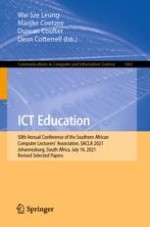2022 | OriginalPaper | Buchkapitel
Minimising Tertiary Inter-group Connectedness Over Successive Rounds
verfasst von : Andrew Broekman, Linda Marshall
Erschienen in: ICT Education
Aktivieren Sie unsere intelligente Suche, um passende Fachinhalte oder Patente zu finden.
Wählen Sie Textabschnitte aus um mit Künstlicher Intelligenz passenden Patente zu finden. powered by
Markieren Sie Textabschnitte, um KI-gestützt weitere passende Inhalte zu finden. powered by
